Expert Gardeners Outside London: Cultivating Green Spaces Beyond the Capital
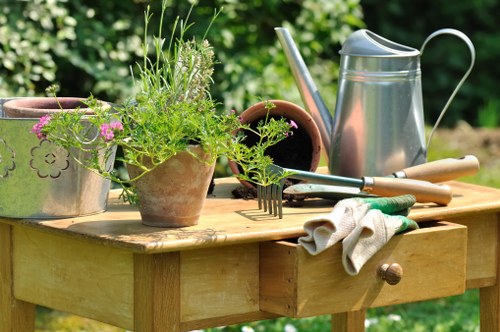
London is renowned for its stunning gardens and green spaces, but just beyond the city's bustling streets lie equally impressive areas where gardeners thrive. Gardeners outside London benefit from a variety of climates, soils, and community support that enable them to create beautiful and sustainable gardens.
Whether you’re a seasoned gardener or a beginner looking to start your own green space, understanding the unique aspects of gardening outside London can help you achieve success. This article explores the best practices, local tips, and essential information for gardeners in the surrounding regions.
From choosing the right plants to managing garden pests, gardeners outside London have access to resources that cater to their specific needs. Let’s delve into the key factors that make gardening outside London both rewarding and manageable.
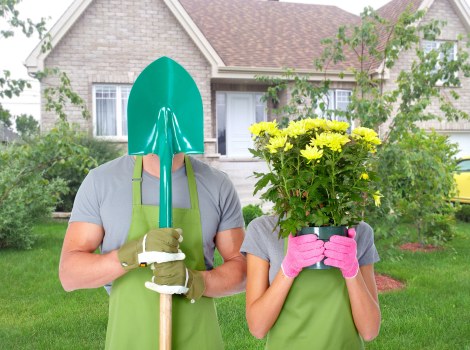
Benefits of Gardening Outside London
Gardening outside London offers numerous advantages that can enhance both your gardening experience and the environment. Here are some of the key benefits:
- Space Availability: Unlike the limited space in London, areas surrounding the capital often provide larger garden plots, allowing for diverse planting and creative layouts.
- Varied Climate: The microclimates in regions outside London can support a wider range of plant species, enabling gardeners to experiment with different varieties.
- Community Support: Many suburban and rural areas have active gardening communities that offer support, knowledge sharing, and local events.
- Amazing Scenery: The picturesque landscapes outside London provide a beautiful backdrop for any garden, enhancing the overall aesthetic appeal.
These benefits make gardening outside London an attractive option for many enthusiasts looking to cultivate their green spaces.
Moreover, the proximity to nature outside the urban environment can significantly reduce stress and provide a peaceful retreat for gardeners.
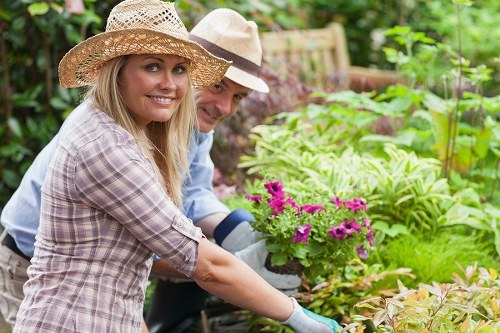
Choosing the Right Plants
Selecting the appropriate plants is crucial for a thriving garden. Gardeners outside London have the advantage of a mild climate, which allows for a diverse range of plants.
Perennials and Annuals
Perennials such as lavender, foxglove, and hostas come back year after year, providing long-term structure to your garden. Annuals like marigolds, petunias, and snapdragons add vibrant color and can be rotated seasonally.
Native Plants
Incorporating native plants is beneficial as they are well-adapted to the local climate and soil conditions, requiring less maintenance and water. Additionally, native plants support local wildlife, including pollinators like bees and butterflies.
Vegetable Gardens
For those interested in growing their own food, vegetable gardens can be highly productive. Common vegetables grown outside London include tomatoes, cucumbers, carrots, and leafy greens.
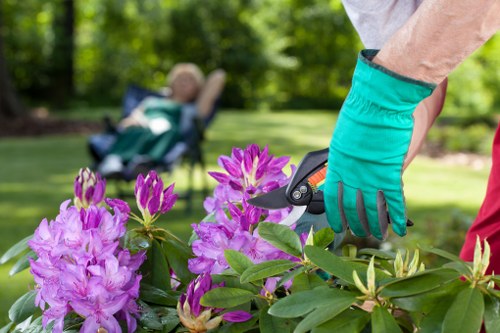
Soil Preparation and Maintenance
A well-prepared soil is the foundation of a successful garden. Here are some tips for soil preparation and maintenance:
Testing Soil Quality
Before planting, it’s essential to test your soil’s pH and nutrient levels. Soil testing kits are available at local garden centers and can help determine if any amendments are needed.
Adding Compost
Incorporating compost improves soil structure, enhances fertility, and boosts microbial activity. It also helps retain moisture, reducing the need for frequent watering.
Mulching
Applying mulch around plants conserves moisture, suppresses weeds, and regulates soil temperature. Organic mulches like bark, straw, and leaf compost are excellent choices.
Crop Rotation
Practicing crop rotation prevents soil depletion and reduces the risk of pests and diseases. Rotate plant families annually to maintain soil health.
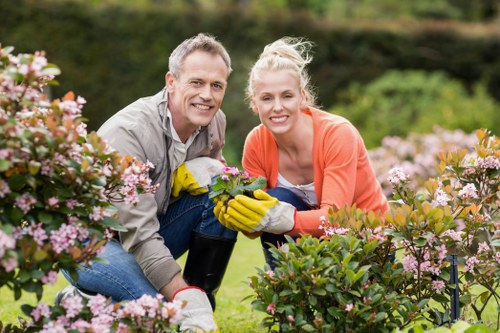
Pest and Disease Management
Managing pests and diseases is a common challenge for gardeners. Implementing integrated pest management (IPM) strategies can help control unwanted pests effectively.
Identification
Properly identifying pests and diseases is the first step in managing them. Use local resources or consult with gardening experts to accurately diagnose issues.
Natural Remedies
Employing natural remedies such as neem oil, insecticidal soaps, and introducing beneficial insects like ladybugs can help control pest populations without harming the environment.
Preventative Measures
Maintaining garden hygiene by removing diseased plant material and ensuring proper spacing for air circulation can prevent the spread of diseases.
Chemical Controls
As a last resort, chemical controls may be necessary. Always follow the manufacturer’s instructions and opt for environmentally friendly options when possible.

Tools and Equipment for Gardeners
Having the right tools and equipment can make gardening more efficient and enjoyable. Essential tools for gardeners outside London include:
- Hand Tools: Trowels, pruners, and cultivators are indispensable for planting, trimming, and weeding.
- Watering Equipment: Hoses, watering cans, and drip irrigation systems ensure your plants receive adequate moisture.
- Soil Tools: Shovels, spades, and rakes help in soil preparation and maintenance tasks.
- Protective Gear: Gloves, hats, and knee pads provide comfort and safety while working in the garden.
- Storage Solutions: Shed or storage bins keep your tools organized and protected from the elements.
Investing in quality tools can save time and effort, making your gardening experience more productive.
Regular maintenance and proper storage of tools extend their lifespan and ensure they remain effective year after year.
Additionally, consider ergonomically designed tools to reduce strain and prevent injuries during extended gardening sessions.

Seasonal Gardening Tips
Adjusting your gardening practices according to the seasons can lead to healthier plants and more bountiful yields. Here are some seasonal tips for gardeners outside London:
Spring
Start by preparing the soil and planting early-season vegetables and flowers. Prune trees and shrubs to promote healthy growth.
Summer
Focus on watering, weeding, and harvesting. Implement shade cloths or mulches to protect plants from intense heat.
Autumn
Plant autumn vegetables and perennials. Clean up garden debris and add compost to enrich the soil for the next spring.
Winter
Protect sensitive plants with covers and plan for the upcoming gardening season. Use the downtime to repair tools and organize your garden space.
Additional Seasonal Tips
Regardless of the season, regular monitoring of plant health and timely interventions are essential for maintaining a thriving garden.

Local Resources for Gardeners Outside London
Access to local resources can significantly enhance your gardening efforts. Gardeners outside London can take advantage of the following resources:
- Local Nurseries: Offering a wide selection of plants, seeds, and gardening supplies tailored to the region’s climate.
- Gardening Clubs: Joining a local gardening club provides opportunities for knowledge sharing and community support.
- Workshops and Classes: Many areas offer educational programs on topics such as organic gardening, composting, and landscape design.
- Online Forums: Participate in online communities to seek advice, share experiences, and stay updated on gardening trends.
Utilizing these resources can provide valuable insights and assistance, helping you overcome challenges and achieve your gardening goals.
Additionally, local botanical gardens and arboretums can serve as inspiration and offer educational opportunities for gardeners of all levels.

10 Areas Near London Perfect for Gardeners
The regions surrounding London offer diverse environments ideal for gardening. Here are ten areas that gardeners outside London should consider:
- Guildford: Known for its fertile soil and mild climate, Guildford is perfect for a variety of plants.
- St Albans: With a rich gardening history, St Albans offers numerous community gardens and nurseries.
- Richmond: Famous for Richmond Park, gardening enthusiasts can draw inspiration from its expansive green spaces.
- Windsor: The proximity to Windsor Great Park provides ample opportunities for learning and gardening activities.
- Cambridge: Cambridge’s blend of tradition and innovation makes it a great place for experimental gardening techniques.
- Reading: Reading’s diverse climate supports both ornamental and food gardens, catering to various interests.
- Slough: With numerous gardening events and markets, Slough is a hub for active gardeners.
- Beaconsfield: Known for its beautiful landscapes, Beaconsfield is ideal for creating picturesque gardens.
- Berkhamsted: Berkhamsted offers a supportive community and excellent gardening resources.
- Uxbridge: Uxbridge’s strategic location provides easy access to gardening supplies and educational resources.
Each of these areas has its unique features that cater to different gardening styles and preferences, making them excellent choices for gardeners outside London.

Challenges Faced by Gardeners Outside London
While gardening outside London has its benefits, there are also challenges that gardeners may encounter:
Pest Control
Pests can cause significant damage to gardens. Identifying and managing pests early is crucial to prevent extensive harm.
Weather Extremes
Unpredictable weather patterns, including heavy rains or droughts, can affect plant health. Implementing proper drainage and irrigation systems can mitigate these issues.
Soil Quality
Variations in soil quality require gardeners to amend their soil appropriately to provide the best conditions for plant growth.
Access to Resources
While resources are generally available, some gardeners may find it challenging to access specialized supplies or expertise.
Overcoming Challenges
By staying informed, seeking community support, and utilizing available resources, gardeners outside London can effectively overcome these challenges.
Continuous learning and adaptability are key to maintaining a successful and resilient garden.

Sustainable Gardening Practices
Adopting sustainable gardening practices ensures that your garden remains healthy and environmentally friendly. Here are some sustainable methods:
- Composting: Recycling organic waste into compost enriches the soil and reduces landfill waste.
- Rainwater Harvesting: Collecting rainwater for irrigation conserves water and reduces dependence on municipal sources.
- Organic Pest Control: Using natural pest control methods minimizes chemical usage and protects beneficial insects.
- Crop Diversity: Planting a variety of species reduces the risk of pest outbreaks and promotes a balanced ecosystem.
Implementing these practices not only benefits your garden but also contributes to a healthier environment.
Additionally, sustainable gardening can lower maintenance costs and improve the resilience of your plants against diseases and pests.

Gardening for All Ages
Gardening is an activity that can be enjoyed by people of all ages. Here’s how different age groups can benefit from gardening outside London:
Children
Gardening teaches children responsibility, patience, and the basics of plant biology. It’s a fun way to engage them with nature.
Adults
For adults, gardening serves as a relaxing hobby that reduces stress and promotes physical activity.
Seniors
Seniors can enjoy gardening as a gentle form of exercise and a way to stay mentally engaged.
Inclusive Gardening Practices
Creating accessible garden spaces with raised beds and ergonomic tools ensures that everyone can participate regardless of physical abilities.
Community gardens also offer opportunities for intergenerational interaction, fostering a sense of community and shared purpose.

Planning Your Garden Layout
Effective garden planning enhances functionality and aesthetics. Consider the following when designing your garden layout:
Sunlight and Shade
Assess the sunlight patterns in your garden to place plants accordingly. Some plants thrive in full sun, while others prefer shade.
Plant Grouping
Group plants with similar water and light requirements together to simplify maintenance and ensure optimal growth conditions.
Pathways and Access
Designate pathways for easy access to different areas of the garden, making it convenient to tend to plants and manage tasks.
Aesthetic Elements
Incorporate features like seating areas, trellises, and water features to add visual interest and create a welcoming environment.
Flexibility in Design
Allow for flexibility in your garden design to accommodate changes in plant growth and personal preferences over time.

Maintaining Your Garden
Regular maintenance is essential for a healthy and thriving garden. Key maintenance tasks include:
- Watering: Ensure plants receive adequate moisture, adjusting for seasonal changes.
- Weeding: Remove weeds regularly to prevent competition for nutrients and water.
- Pruning: Trim plants to promote healthy growth and remove dead or diseased parts.
- Fertilizing: Provide necessary nutrients through organic or synthetic fertilizers as needed.
- Monitoring: Keep an eye on plant health and address any issues promptly.
Consistent maintenance routines help sustain garden productivity and beauty throughout the year.
Additionally, seasonal tasks such as planting, harvesting, and preparing the garden for winter contribute to long-term garden health.

Technology in Modern Gardening
Advancements in technology have revolutionized modern gardening, making it easier and more efficient. Here are some technological tools that gardeners outside London can utilize:
Smart Irrigation Systems
Automated irrigation systems can adjust watering schedules based on weather conditions, ensuring optimal moisture levels for plants.
Gardening Apps
Mobile apps provide resources such as plant care guides, pest identification tools, and garden planning features to assist gardeners in managing their spaces.
Greenhouses
Greenhouses extend the growing season by creating controlled environments, allowing gardeners to cultivate plants that may not thrive outdoors year-round.
Soil Sensors
Soil sensors monitor moisture levels, pH, and nutrient content, providing real-time data to help gardeners make informed decisions.
Embracing Innovation
Incorporating technology into your gardening practices can enhance productivity, reduce labor, and promote sustainable gardening methods.
Staying updated with the latest gardening technologies ensures that your garden remains efficient and resilient against challenges.

Conclusion
Gardening outside London offers a unique blend of opportunities and challenges that can lead to a fulfilling and productive gardening experience. By understanding the local climate, choosing the right plants, and utilizing available resources, gardeners can create beautiful and sustainable gardens.
Whether you’re cultivating a vegetable patch, designing an ornamental garden, or simply enjoying the therapeutic benefits of gardening, the areas surrounding London provide an ideal environment to nurture your green thumb.
Embrace the diversity and support available, and watch your garden flourish beyond the capital.

Frequently Asked Questions
1. What are the best plants to grow outside London?
Some of the best plants to grow outside London include native species like lavender and foxglove, as well as vegetables such as tomatoes and cucumbers. It’s important to choose plants that are well-suited to the local climate and soil conditions.
2. How can I improve my soil quality for gardening?
Improving soil quality can be achieved by adding compost, using organic fertilizers, and practicing crop rotation. Soil testing can help determine specific amendments needed for optimal plant growth.
3. What are some natural methods for pest control?
Natural pest control methods include using neem oil, introducing beneficial insects like ladybugs, and planting pest-repellent plants such as marigolds and basil.
4. How do I start a vegetable garden outside London?
To start a vegetable garden, choose a suitable location with adequate sunlight, prepare the soil by adding compost, select appropriate vegetable varieties, and implement a regular watering and maintenance schedule.
5. What resources are available for gardeners outside London?
Gardeners outside London can access local nurseries, gardening clubs, workshops, online forums, and botanical gardens for resources, support, and educational opportunities.